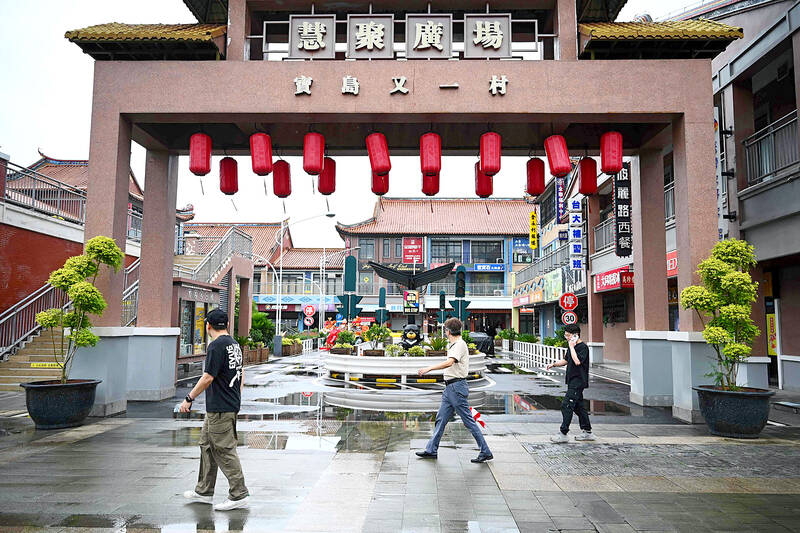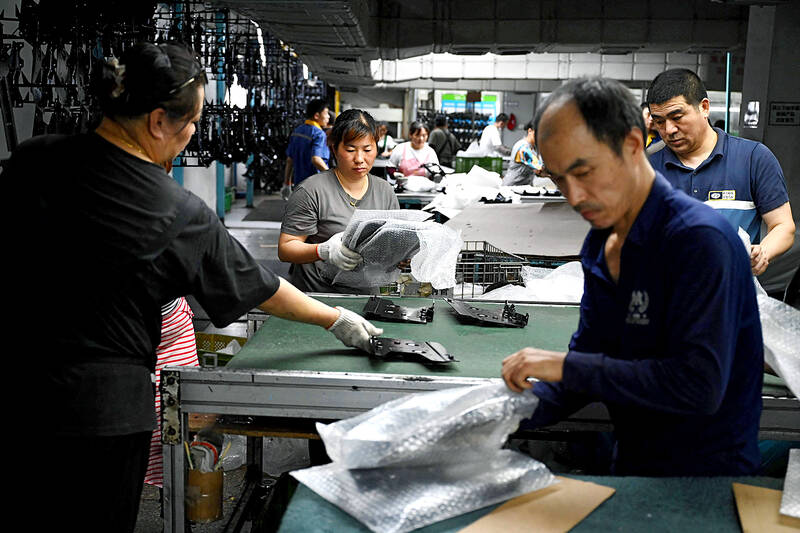Bustling Taipei-style shopping streets, majestic temples to Taiwan’s deities and thriving factories dot the eastern Chinese city of Kunshan, for years a hub for Taiwanese businesses, but now the firms are feeling the strain from cross-strait tensions that have stoked safety fears.
Entrepreneurs from Taiwan poured billions into China when ties began improving in the 1990s, playing an important role in the nation’s rise to become the world’s second-largest economy, but their numbers have dwindled, with the number of Taiwanese working in China dropping from 409,000 in 2009 to 177,000 in 2022, according to estimates provided by the Straits Exchange Foundation.
China’s economic slowdown and mounting trade tensions with Washington are partially responsible, the foundation said.

Photo: AFP
However, James Lee, a 78-year-old Taiwanese industrialist who was forced to close his cable and electrical factory in Guangdong Province in 2022, blamed “politics.”
“You have to be very careful when you speak,” Lee said. “We Taiwanese businessmen are afraid.”
Bolstered by their mastery of Mandarin and business acumen, Taiwanese entrepreneurs have prospered as wily intermediaries between international markets and China’s vast industrial manufacturing base.

Photo: AFP
Perhaps the most famous of them is Terry Gou (郭台銘), the founder of Hon Hai Precision Industry Co, whose vast factories in China churn out iPhones that have helped make it the world’s biggest contract electronics manufacturer.
An hour’s drive from economic powerhouse Shanghai, Kunshan has been a key hub for Taiwanese-owned industry in China since the 1990s.
“Back then, it was a rice field,” said Annie Wang, an industrialist from Taiwan who arrived in Kunshan in 1996.
“Taiwanese companies were fortunate to coincide with the 30 most glorious years of Chinese manufacturing,” she said.
Wang heads an electronics subcontracting manufacturing plant, a small technology park and a coffee utensil brand.
At the height of the boom, Kunshan was home to more than 100,000 Taiwanese, according to unofficial data from local associations, but the number of Taiwanese companies in the city has shrunk from more than 10,000 a decade ago to fewer than 5,000 today.
The Taiwanese entrepreneurs have felt the squeeze as relations between Taipei and Beijing plunge to their lowest depths in years.
The Chinese Communist Party — which claims Taiwan as its territory, but has never controlled it — has hardened its stance against alleged “Taiwanese independence activists,” even calling for the death penalty for “secessionism.”
Rules that encourage citizens to report alleged pro-independence activities have had a chilling effect on Taiwanese businesses in China.
“We are not sending Taiwanese employees [to China] because we don’t know how to guarantee their safety,” Lee said.
“The initial favorable conditions have disappeared, and now there are many additional risks,” Straits Exchange Foundation Secretary-General and Vice Chairman Luo Wen-jia (羅文嘉) said.
China’s economic woes and rising production costs are adding to the problems, he said.
“When we first went there, we thought that China’s economy would continue to improve because its market is so large and its population is so big, but we haven’t seen this materialize because there are some issues — there is the US-China trade war and there was the [COVID-19] pandemic,” said Leon Chen, a Taiwanese businessman who worked at a battery component factory in Jiangxi Province.
In response, Taiwanese manufacturers are turning to new, more profitable — and less politically sensitive — nations.
“Some went to Vietnam, and some went to Thailand, Indonesia and the Philippines, and some returned to Taiwan,” Luo said.
Between 2016 and last year, Taiwanese investments in Vietnam approved by the Ministry of Economic Affairs soared 129 percent, from US$451 million to more than US$1 billion.
Over the same period, those in China fell 62 percent.
This decline could deal a blow to Beijing’s “united front” strategy, which has seen it lean on Taiwanese communities to promote Taiwan’s political integration and, ultimately, unification.
As Beijing launches military drills practicing a blockade of Taiwan and Taipei cracks down on Chinese spies, Taiwanese entrepreneurs risk being caught in the crossfire.
Hon Hai in October 2023 was placed under investigation by Chinese authorities — a move widely seen as linked to a bid for the presidency of Taiwan by its founder.
“There is no way to compare it with the heyday, but we can still make ends meet,” Chen said. “If the environment for doing business in China becomes worse and worse, we would have no choice but to leave.”

Aftershocks from a magnitude 6.2 earthquake that struck off Yilan County at 3:45pm yesterday could reach a magnitude of 5 to 5.5, the Central Weather Administration (CWA) said. Seismological Center technical officer Chiu Chun-ta (邱俊達) told a news conference that the epicenter of the temblor was more than 100km from Taiwan. Although predicted to measure between magnitude 5 and 5.5, the aftershocks would reach an intensity of 1 on Taiwan’s 7-tier scale, which gauges the actual effect of an earthquake, he said. The earthquake lasted longer in Taipei because the city is in a basin, he said. The quake’s epicenter was about 128.9km east-southeast

The Taipei Summer Festival is to begin tomorrow at Dadaocheng Wharf (大稻埕), featuring four themed firework shows and five live music performances throughout the month, the Taipei Department of Information and Tourism said today. The festival in the city’s Datong District (大同) is to run until Aug. 30, holding firework displays on Wednesdays and the final Saturday of the event. The first show is scheduled for tomorrow, followed by Aug. 13, 20 and 30. To celebrate the 30th anniversary of Disney Pixar's movie Toy Story, the festival has partnered with Walt Disney Co (Taiwan) to host a special themed area on

BE CAREFUL: The virus rarely causes severe illness or death, but newborns, older people and those with medical conditions are at risk of more severe illness As more than 7,000 cases of chikungunya fever have been reported in China’s Guangdong Province this year, including 2,892 new cases last week, the Centers for Disease Control (CDC) yesterday said it is monitoring the situation and considering raising the travel notice level, which might be announced today. The CDC issued a level 1 travel notice, or “watch,” for Guangdong Province on July 22, citing an outbreak in Foshan, a manufacturing hub in the south of the province, that was reported early last month. Between July 27 and Saturday, the province reported 2,892 new cases of chikungunya, reaching a total of 7,716

The New Taipei City Government today warned about the often-overlooked dangers of playing in water, and recommended safe swimming destinations to cool off from the summer heat. The following locations in the city as safe and fun for those looking to enjoy the water: Chienshuiwan (淺水灣), Baishawan (白沙灣), Jhongjiao Bay (中角灣), Fulong Beach Resort (福隆海水浴場) and Sansia District’s (三峽) Dabao River (大豹溪), New Taipei City Tourism and Travel Department Director-General Yang Tsung-min (楊宗珉) said. Outdoor bodies of water have variables outside of human control, such as changing currents, differing elevations and environmental hazards, all of which can lead to accidents, Yang said. Sudden